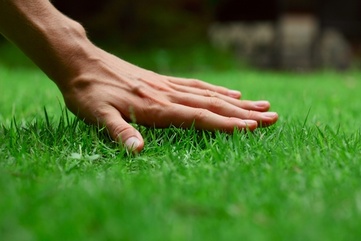
Winter can be tough on lawns, so as the weather warms up and the days get brighter, it’s good to pay your lawn some attention to get it back into shape for the summer. Here are our top tips for April lawn care.
Consider mowing less often for a more wildlife-friendly lawn, and leave your lawnmower blades on a higher setting. This allows low-growing plants like self-heal, buttercups, clover and other wildflowers to thrive, providing pollen for bees and other pollinators. If you prefer the look of a neatly mown lawn, why not leave a small area unmown as a wildlife haven?
For short turf, start mowing more regularly this month as the grass begins to grow again after winter. Make sure your mower blades are sharp and don’t mow when the grass is wet. It’s often best to mow in the afternoons to give the dew time to dry off in the mornings. Initially, trim with the lawnmower blades on a high setting, gradually moving to a lower setting as the growing season progresses.
Give your lawn a boost after winter with a proprietary spring lawn feed. This will contain a balanced mix of nitrogen, phosphorus and potassium to promote the growth of strong, healthy grass that can out-compete weeds and moss.
As the grass starts to grow, lawn weeds like dandelions and docks will begin to appear too. Keep on top of them by digging them out by hand (there are special tools available to help tackle dandelions and other weeds with long taproots). If there are too many weeds to tackle by hand, wait until next month and treat them with a lawn weedkiller. It’s best to wait at least two weeks after feeding the lawn to apply weedkiller.
Tackle moss in your lawn by raking it with a spring tine rake. If necessary, you can apply moss killer (always following the manufacturer’s instructions) and rake out the dead moss once the moss killer has taken effect. Dead moss takes a long time to break down, so it’s best not to add it to a compost heap.
If your lawn has bare patches, now’s the time to tackle them. It’s now also ideal to sow seed for new lawns, as the soil has started to warm up. Before sowing, prepare your soil by breaking it up with a garden fork and raking it over to produce a level surface with a fine, crumbly texture. Sow the seed and lightly rake it in. You may need to net the area after sowing to stop birds from eating all your grass seed! If there is no rain for a couple of days, water the site using a sprinkler or a watering can with a fine rose.
Our range of lawn care tools, feed and seed, will have your lawn looking lush and inviting this summer, so visit our centre soon!
The Otter Nursery will be closed for the Holiday’s. Our last trading day will be Monday 23rd December 2024, normal hours will resume on
This is an opportune moment to plant your Root ball hedging. Root Balls are grown in fields and are typically larger, more mature plants,
Monday 21st October until Friday 1st November Join us for a FREE Halloween Word Hunt -activity for kids at The Otter Nursery. Bring your
We recently contributed plants to The Clubhouse Project, and we were thrilled to have received a card with photos showcasing the wonderful garden makeover
Join us for a FREE Olympic-themed summer word activity for kids starting on Monday, August 12th, and running until Saturday, August 24th at The
The Otter Nursery
Murray Road
Ottershaw
Surrey
KT16 0HT